Interview: SUPER Writer-Director James Gunn
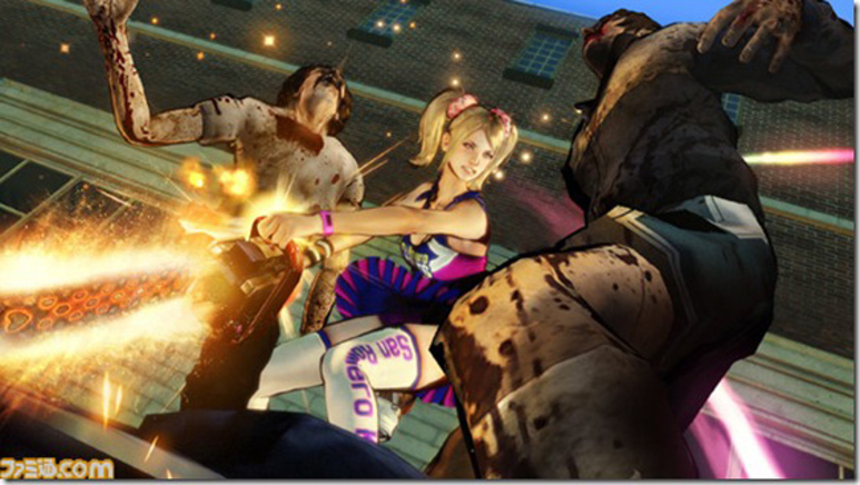
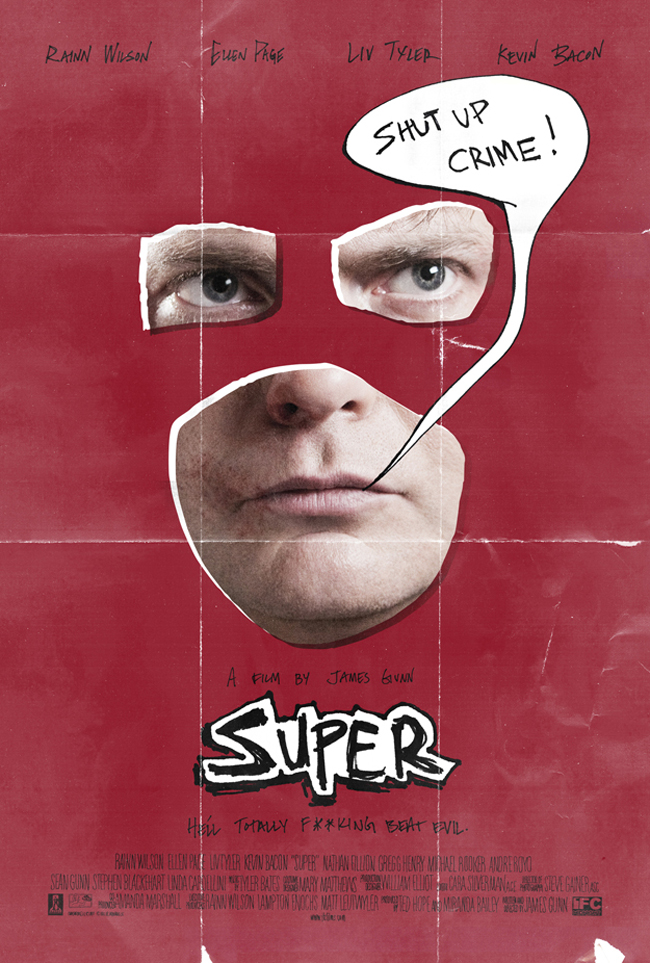
Writer-director-actor-comic fan-narrative game designer James Gunn's Super hits DVD, Blu-Ray, and VOD via IFC films this week. We thought we'd speak with the man behind Slither, and the scripts for Dawn of the Dead and Scooby Doo about his bent superhero comedy starring Rainn Wilson as well as his first stabs at writing for videogames, and what his opinion is on the big DC Comics relaunch in September.
ScreenAnarchy: Having seen Super and some of the other recent superhero adaptations, I'm kind of picking up a thread here that's not necessarily present in the comics: and that's about the emasculated male more or less getting his balls back by putting on a costume.* Do you think there's anything to why that? Was there a particular appeal to this theme for Super?
James Gunn: Well, it does come from comics. I think--a couple of things. I don't think that's what the story of Super is for me. For me, the story of Super really has a lot more to do with a guy who has a belief and has a relationship with what he sees as God, and his attempt to fulfill that relationship as best as he can. And it's the overall questions of if Frank insane, or if what he's experiencing a real [religious] experience.
So, I don't really see it being about the neutered male. I could see easily where you could see that, and there's definitely some aspects of that in the movie, but I don't see that being specifically what the movie's about.
But I do think that all of this stuff absolutely comes from comic books. When I wrote Super in 2002, it wasn't a commentary on today's comic book heroes, it was a result of the deconstructionist comics of Alan Moore, whether it be Watchmen or Top Ten, you know. [Or] Rick Veitch in The One, not to mention Chris Ware--there's just tons and tons of deconstructionist superhero comics. That was just the thing that smart people were writing about that still loved superheroes, and that's where Super comes from--that's its birthplace. But then, of course, mixed with Martin Scorsese and whoever else.
ScreenAnarchy: So, why was Rainn the right guy for this role about a man with a complicated relationship with God and an even more complicated relationship with his wife?
JG: When I was first going to make this movie, back in 2005--and I had financing for it--the big problem was that I couldn't agree with the financier on getting a lead actor. And I really needed someone who had both the comedic chops and the dramatic chops, who was a big enough goofball that we could imagine him getting picked on by his fellow cook at the diner, and yet who was also physically imposing enough that you could imagine him going out and kicking ass with a pipe wrench, being scary. And the only person who I really thought could do it at the time was John C. Reilly. But in 2005, 2004--whenever this was happening--John C. Reilly was not considered a big star yet, he wasn't considered capable of financing a low-budget film.
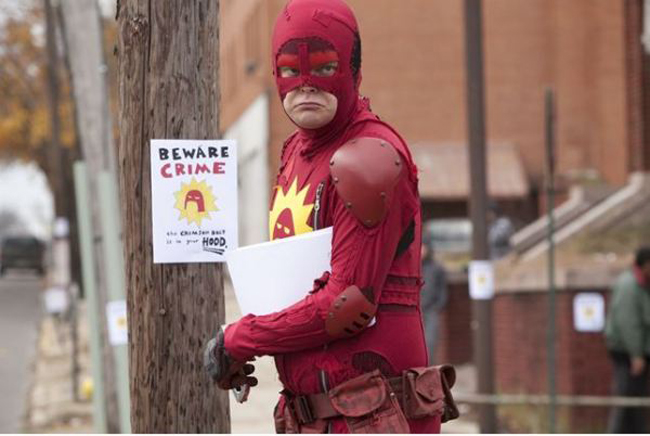
So at the time I made Slither instead of making Super, and I just became distracted by other projects but it never fully left me. You know, a couple of years ago, my ex-wife, Jenna Fischer, called up and she said, "What are you doing with Super? That's my favorite script you've written, I really want to see you make that movie." And I said, [that I didn't] know--the movie's very dark, it's esoteric, it's not the most commercial move for me to make for my career--I really do love it, but I'm just not sure it's the right thing to do. And she said, "Well listen: have you ever thought of Rainn as Frank?" Now, as soon as she said it--I've known Rainn for five years, we were friends--it seemed like it was perfect. He was all of those things that I had been looking for.
And in addition, one of those things I really love as a director about working with actors is sharing a new aspect of that actor with an audience. And I think Rainn has gotten a lot of chances to do this sort of goofy comedy, so to be able to show this dramatic part of his range is something that he hasn't gotten the opportunity to do for a wider audience.
So, right away I thought Rainn was perfect and gave him the script that day. He responded to me in an hour saying he was in, and that was that--we were off and running from that point.
ScreenAnarchy: Did he get any kind of crash-course on comics at all or the comic fan experience?
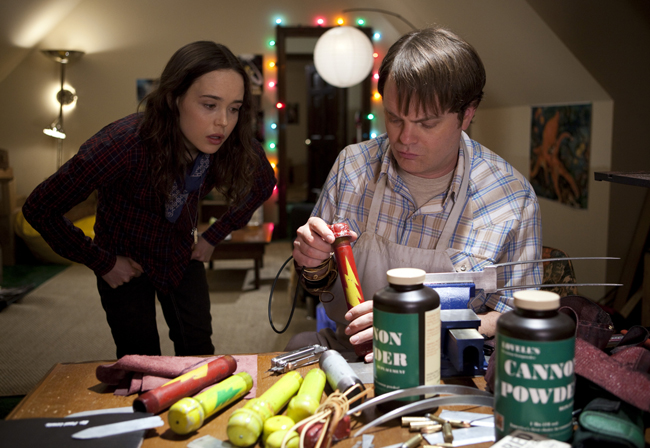
JG: Rainn and I talked about it a lot, but the truth is in the movie, Frank's not really a comic book fan. He gets his inspiration to be a superhero off of a TV Christian superhero. So, he's not really a comic book fan in the movie--he has to go to the comic book store to do research.
We talk a lot about comic books because the truth is I'm a comic book geek [and] I grew up being a comic book geek and he's a science fiction geek and that's what he grew up doing, and so we have a lot of conversations about the differences between comic geeks and science fiction geeks. And he's been around a lot of comic geeks because there's a large crossover there. I mean, he played Dungeons and Dragons and did all of this stuff that was very geek. So I didn't have to give him too much of a crash course.
ScreenAnarchy: Are you paying attention to any of the DC New 52 stuff? [Ed. DC Comics is relaunching their entire line with new #1's in September. Read a comic, people!]
JG: Yeah, completely! Did you get the new little thing from the book store with the breakdowns of all of them?
ScreenAnarchy: I did. My store's doing this thing where they're offering a discount based on how many books you buy.
JG: I'm gonna get 'em all.
ScreenAnarchy: Christ.
JG: I know. I'm buying into it. I told my guy I was going to get them all, and then I'm reading through the list and some of them--I don't know if I want this War Stories--I can't believe I went for all 52. But yeah, I'm going to get all 52 of them.
I don't have a big problem with it if they're good. If they're good, I don't give a shit! If they're bad, then that's really going to be terrible. But honestly, DC Comics, there's really been some good ones lately--Grant Morrison's Batman and Robin, to begin with--but there's also been some terrible stuff out there.
ScreenAnarchy: Morrison's incredible. I just hate that there's going to be that huge break between this year and next in his Batman, Incorporated. But kind of dragging it back to one of your earlier points about deconstructionist work in comics--do you think that writers are going to that well too often nowadays instead of simply trying to tell good stories?
JG: Um, no. I think because it's evolved from being "deconstructionist" to being part of the landscape. I mean, what happened is not so different from what happened in '64 with Spider-Man: up until comic book stories were all superheroes who went out and fought crime or whatever, but that wasn't really part of the story. And then Spider-Man came along and it was two sides of the character. Spider-Man stopped and then it was just this guy and it went one level deeper. And then Watchmen came along [and] took it one level further. All of a sudden, it's not only playing with the personal lives of the characters and the adventures they go on but it's also dealing with the morality of the characters themselves, and the questions of what it means to be beating up on other people and wearing a costume--what kind of personality does that?
We call it "deconstruction" but some of it is not that. Some of it is just going deeper levels into various characters, trying to make things more believable. I mean, it's hard to believe that people put on costumes and run around and fight crime. I mean, it's absolutely goofy. So how can you make it so that you believe that? And somebody being insane is certainly the easiest way to explain why they run around and fight crime.
ScreenAnarchy: Yeah, there was a post up somewhere today where a journalist did a ride-along with Phoenix Jones.
JG: I know Phoenix Jones--he came to our premiere.
ScreenAnarchy: And I guess, to get back to your work--sorry to take it so far off into comics--
JG: I don't care. I could talk about comics all day long.
ScreenAnarchy: You act in your movies almost as much as you write and direct them. How much of that is from the Troma DIY thing? Just the idea that you have to do everything and have to be a part of evetying to make it work?
JG: I don't know, I think it's just [that] a lot of times it comes from--I was an actor, I came to Los Angeles and I was an actor as much as I was anything else. [I] was offered sitcom deals and all this stuff, but I was more interested in--well, I'm just controlling, frankly. I was more interested in the creative side of things, in writing and directing than I was in the acting aspect of it.
But I still have an actor's personality to some degree and still enjoy acting, so that's part of it. And part of it is we'll cast these roles and I know I'm going to play some role in my movie at some point--just to be, it's like a Hitchcock thing, or whatever. But I don't really know what that role's going to be until there's some role that's difficult to cast. And I had a friend who I wanted to play Demonswill in Super--my friend, Michael Rosenbaum from Smallville--and he had scheduling problems and he couldn't do the role and so I stepped in for him. It was the same thing on Slither--we had a hard time casting the teacher that talks to Elizabeth Banks, and I was like "Okay, I'll play that role."
It's more like that.
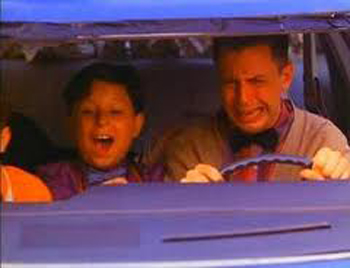
Same thing when I was in Tromeo and Juliet: we didn't have the guy to play that character--someone just forgot to cast him or something, which is what happens on a Troma movie. And so I was like, "I'll play this guy." Even though I was 25 years old, or whatever, playing this father of three or two, or whatever--it was very strange and I was too young to play that role. But I just sort of end up where I end up.
ScreenAnarchy: Yeah, you've had kind of a weird trajectory to your career. I understand you're working on a game with Suda51: Lollipop Chainsaw. Can you tell us what you're up to here?
JG: Yeah, yeah, Lollipop Chainsaw is a videogame that was developed by Suda51 and Grasshopper Studios. They did No More Heroes and some really awesome cult videogames. Warner Brothers was distributing their newest game and Grasshopper and Warner came to me and they showed be the aesthetic of what they were doing, and they said they thought it was a lot like what I'd done in certain things: a mix of cult, colorful, pop, iconography and a dark sense of humor and a lot of gore. And I thought it was the most awesome thing I'd ever seen when I saw the original images, and so I said, "I'm in!"
And I wanted to learn about writing for videogames--I'm a big videogamer--and wanted to learn more about it. So, I signed on as a student, in a way, to learn about this. [I] helped them to craft the characters so that they retained the edginess and strangeness of Suda51's stuff, but they're probably a little more graspable by a Western audience. And my sense of humor is probably the biggest thing that's a part of it, in terms of creating the characters and situations and helping to write all that stuff--you know, trying to make the moments as fun as possible.
And in addition, I also got a lot of people who I can't talk about yet--you know, a lot of people that you see that recur in my various movies within in the world of James Gunn--that have roles in the videogame as characters. It was a lot of fun and I got to direct them in their performances, which was a lot of fun as well.
ScreenAnarchy: It's one of your projects I'm most excited to hear about from you, particularly when you add in how much I like Suda's work.
JG: It's harder because I'm not in control--I come in to try to help things along but I'm very excited about what I've seen so far and how it's coming along, so I've got my fingers crossed that Lollipop Chainsaw is going to be something special.
ScreenAnarchy: And what else are you up to?
JG: I've got this movie, Movie 43 coming out in April with the Farrelly Brothers, and it's a whole bunch of shorts with a bunch of different comedy directors and my short has Elizabeth Banks and Josh Duhamel and it's this animated creature and it's completely, completely, completely fucked up. But I love it a lot and it's funny as hell and I'm excited about that. And then I'm gonna figure out what I'll do next.
ScreenAnarchy: Well, we'll be looking forward to it. Thanks so much!
Super hits DVD and Blu-Ray today from IFC Films on August 9th.
*On this point, I have to concede to Gunn, at least in the way that I phrased the original question. While most mainstream comics are essentially morality plays ("With great power, etc.), those books that Gunn listed and quite a few others in the deconstructionist mold belong to the line of thinking to which I alluded. Twenty years since I started reading them, I know some comic stuff, y'all.







